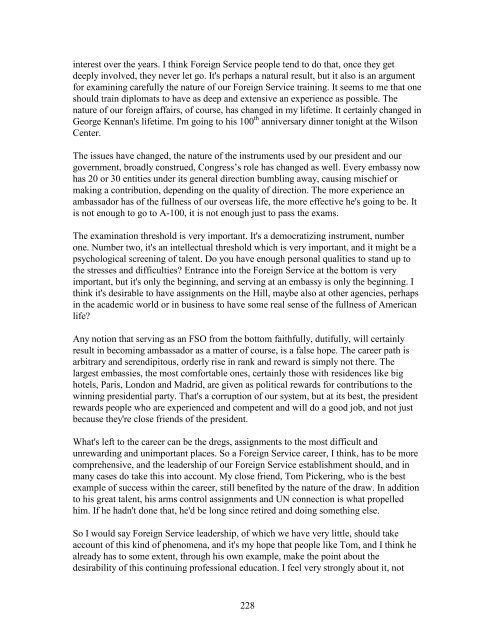1 The Association for Diplomatic Studies and Training Foreign ...
1 The Association for Diplomatic Studies and Training Foreign ...
1 The Association for Diplomatic Studies and Training Foreign ...
Create successful ePaper yourself
Turn your PDF publications into a flip-book with our unique Google optimized e-Paper software.
interest over the years. I think <strong>Foreign</strong> Service people tend to do that, once they get<br />
deeply involved, they never let go. It's perhaps a natural result, but it also is an argument<br />
<strong>for</strong> examining carefully the nature of our <strong>Foreign</strong> Service training. It seems to me that one<br />
should train diplomats to have as deep <strong>and</strong> extensive an experience as possible. <strong>The</strong><br />
nature of our <strong>for</strong>eign affairs, of course, has changed in my lifetime. It certainly changed in<br />
George Kennan's lifetime. I'm going to his 100 th anniversary dinner tonight at the Wilson<br />
Center.<br />
<strong>The</strong> issues have changed, the nature of the instruments used by our president <strong>and</strong> our<br />
government, broadly construed, Congress’s role has changed as well. Every embassy now<br />
has 20 or 30 entities under its general direction bumbling away, causing mischief or<br />
making a contribution, depending on the quality of direction. <strong>The</strong> more experience an<br />
ambassador has of the fullness of our overseas life, the more effective he's going to be. It<br />
is not enough to go to A-100, it is not enough just to pass the exams.<br />
<strong>The</strong> examination threshold is very important. It's a democratizing instrument, number<br />
one. Number two, it's an intellectual threshold which is very important, <strong>and</strong> it might be a<br />
psychological screening of talent. Do you have enough personal qualities to st<strong>and</strong> up to<br />
the stresses <strong>and</strong> difficulties? Entrance into the <strong>Foreign</strong> Service at the bottom is very<br />
important, but it's only the beginning, <strong>and</strong> serving at an embassy is only the beginning. I<br />
think it's desirable to have assignments on the Hill, maybe also at other agencies, perhaps<br />
in the academic world or in business to have some real sense of the fullness of American<br />
life?<br />
Any notion that serving as an FSO from the bottom faithfully, dutifully, will certainly<br />
result in becoming ambassador as a matter of course, is a false hope. <strong>The</strong> career path is<br />
arbitrary <strong>and</strong> serendipitous, orderly rise in rank <strong>and</strong> reward is simply not there. <strong>The</strong><br />
largest embassies, the most com<strong>for</strong>table ones, certainly those with residences like big<br />
hotels, Paris, London <strong>and</strong> Madrid, are given as political rewards <strong>for</strong> contributions to the<br />
winning presidential party. That's a corruption of our system, but at its best, the president<br />
rewards people who are experienced <strong>and</strong> competent <strong>and</strong> will do a good job, <strong>and</strong> not just<br />
because they're close friends of the president.<br />
What's left to the career can be the dregs, assignments to the most difficult <strong>and</strong><br />
unrewarding <strong>and</strong> unimportant places. So a <strong>Foreign</strong> Service career, I think, has to be more<br />
comprehensive, <strong>and</strong> the leadership of our <strong>Foreign</strong> Service establishment should, <strong>and</strong> in<br />
many cases do take this into account. My close friend, Tom Pickering, who is the best<br />
example of success within the career, still benefited by the nature of the draw. In addition<br />
to his great talent, his arms control assignments <strong>and</strong> UN connection is what propelled<br />
him. If he hadn't done that, he'd be long since retired <strong>and</strong> doing something else.<br />
So I would say <strong>Foreign</strong> Service leadership, of which we have very little, should take<br />
account of this kind of phenomena, <strong>and</strong> it's my hope that people like Tom, <strong>and</strong> I think he<br />
already has to some extent, through his own example, make the point about the<br />
desirability of this continuing professional education. I feel very strongly about it, not<br />
228
















